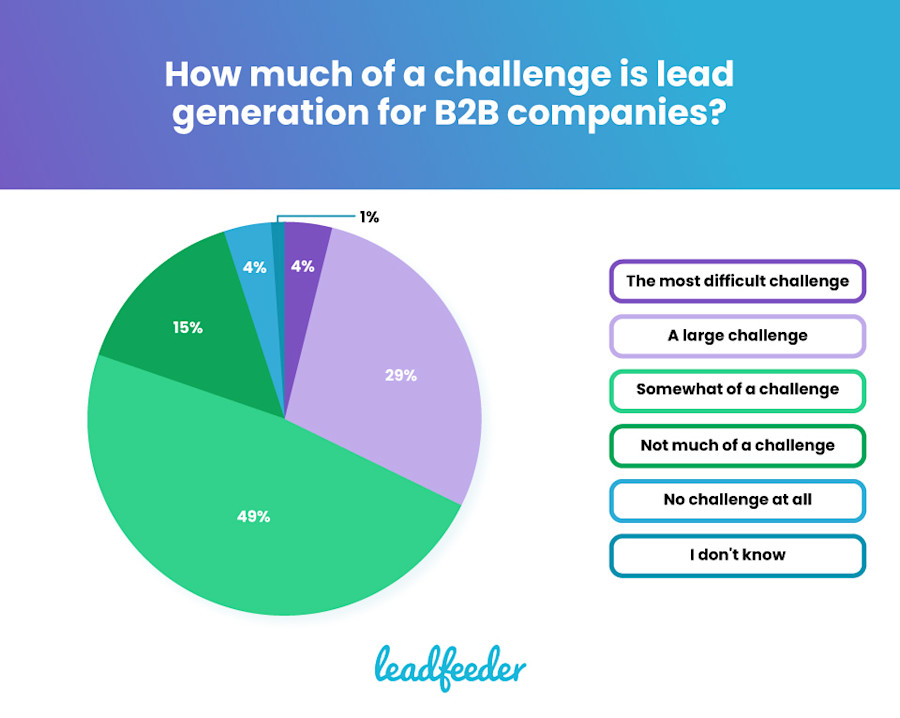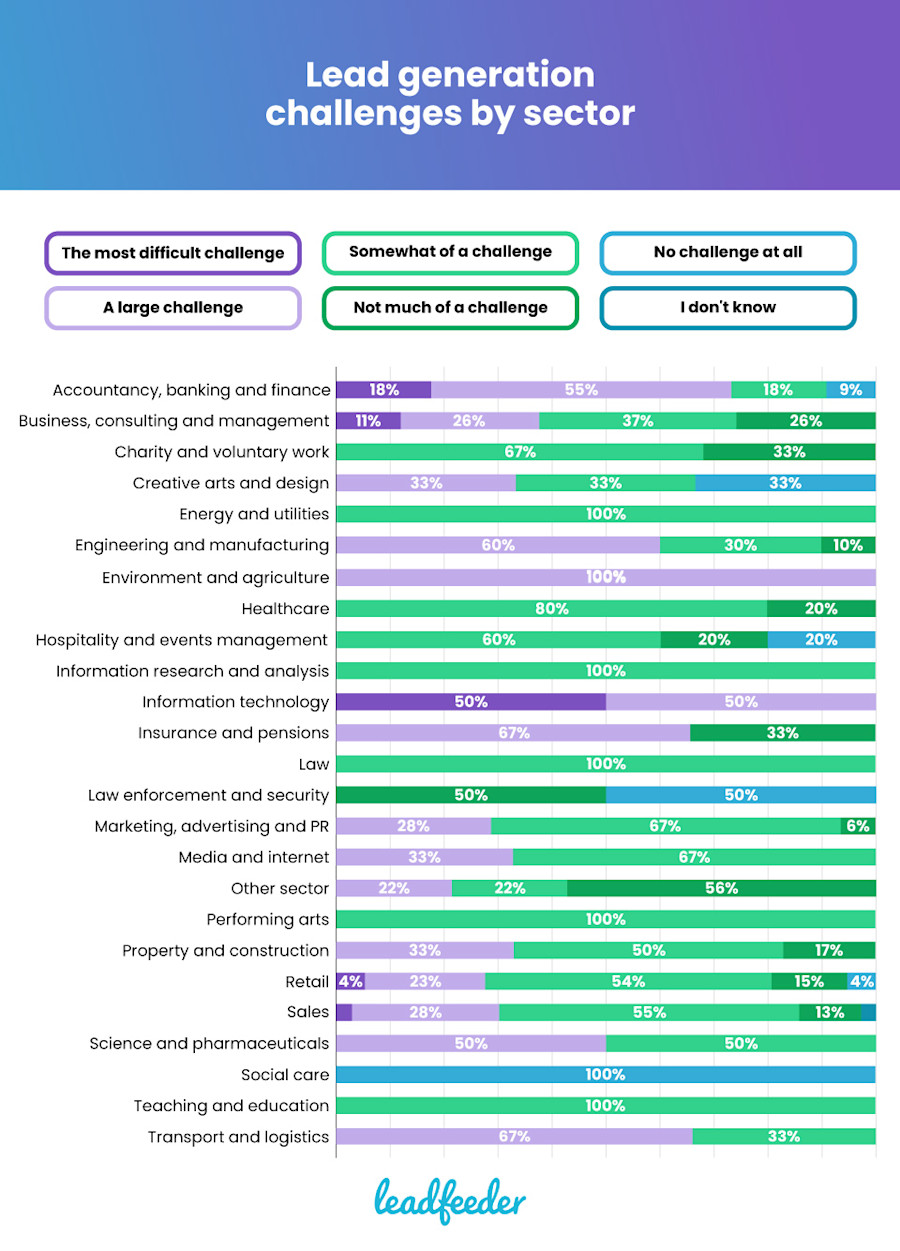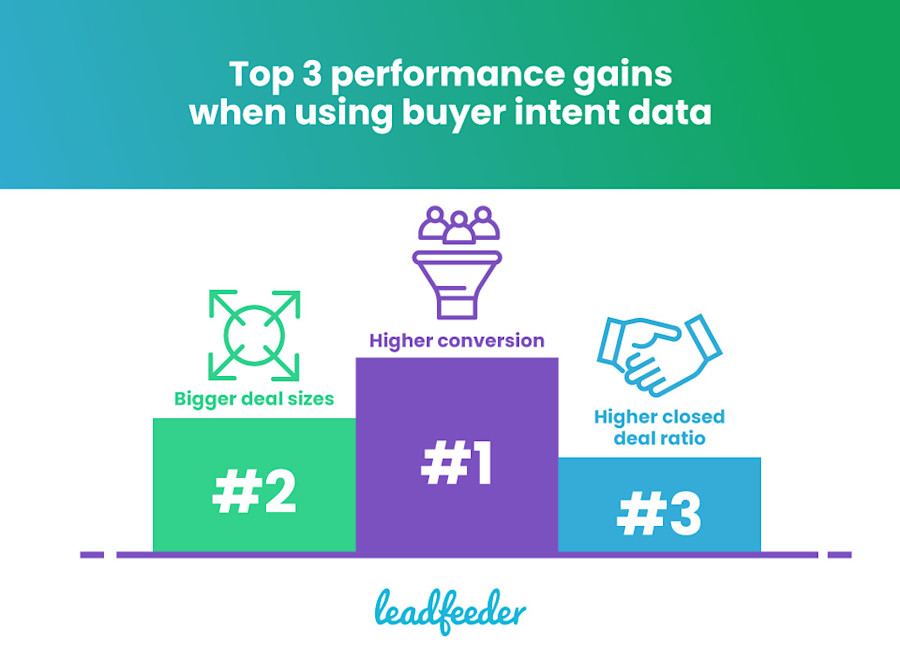Access to buyer intent data is rapidly becoming a differentiating factor for top sales teams around the world, helping them stay laser-focused on the quality leads that matter and drive conversion rates.
What is B2B buyer intent data?
B2B buyer intent data is data showing you which companies are active in the buying cycle. These are companies that are actively sending out strong signals to marketers or salesperson that they are ready to buy, and soon. To make it easier for you to understand, let us look at these 3 examples:
If a company opens up your email newsletter, you can assume that there is active interest from them and that they’re open to receiving additional information from your company.
If a company that meets the criteria of your ideal customer profile visits your website multiple times, then it means there is a high chance for them to become your target account.
If your target account clicks on your social media ads, and interacts with other content marketing initiatives (such as reading blogs, downloading ebooks, and engaging with marketing campaigns), then this company wants something from you.
B2B buyer intent data should not be seen as something magical — it’s simply a signal that one specific company might be interested in purchasing your product and has reached the stage of making a purchase decision and becoming a potential customer.
Online behavior, in the form of buyer intent signals, can give you clues as to whether prospects are in the awareness, consideration, or decision stage. That data reduces the collective noise in the market and allows you to proactively tailor your outreach campaign to its current stage, making it more relevant and likely to start a conversation or influence a conversion.
But the integration of B2B buyer intent data into lead generation is one of the biggest challenges in-house marketing and sales teams continue to face, despite offering many benefits.
So, to find out the pain points and state of play, we asked 200 senior B2B marketing and sales professionals in the US and UK all about their lead generation strategies and what role buyer intent data does or doesn’t play.
According to the survey respondents, 82% continue to find lead generation a challenge, with enterprises of over 250 employees more likely to describe it as a “large challenge” than SMEs. 4% of respondents described lead generation as the most difficult challenge their organization faced today, while 28% considered it a large challenge:

Looking at the responses by sector, there are clear differences in the challenges posed by lead generation.
The sectors that are most challenged by lead generation are: accountancy, banking and finance; engineering and manufacturing; IT; transport and logistics; and insurance and pensions.

Investment in buyer intent data tools is on the rise
One way businesses and decision-makers are looking to overcome their lead generation struggles is to invest in buyer intent data tools to learn more about the behavior of prospective customers.
Over three quarters (76%) of respondents said they now use buyer intent data to inform their sales and marketing strategy, with 65% looking to invest more in the coming 12 months.

The strongest indicators of buyer intent
As discussed previously, there are clear signals when a prospective customer is moving through the sales funnel and may convert if their specific needs are met.
Of the in-house teams surveyed who use buyer intent data, frequency of visits was cited as the strongest indicator of a sales qualified lead, followed by time spent on site, requests for more information, completing a contact form, and downloading assets.

The benefits of buyer intent data
Furthermore, the most reported benefits of using buyer intent data were higher conversion rates (47%), bigger deal sizes (43%) and more deals closed (38%). Only 1% of respondents reported no performance increases, highlighting its value when used correctly.

Other reported benefits of using buyer intent data for lead generation included shorter sales cycles and lower customer acquisition costs.
Knowledge gaps and financial pressures limiting use of buyer intent data B2B companies need a lead generation funnel for the simple reason that, in most cases, a purchase takes a long time to develop. It’s a lengthy process, with 90 percent of B2B sales taking more than one month to close, while 10 percent take more than one year.
While there are a lot of differences in the way individuals make a purchase, there's still a process leading up to a buyer's decision. And increasingly, B2B companies are tracking intent data signals to help them develop smarter, more customer-focused marketing efforts and sales strategies that are designed around the modern buyer cycle and buyer journey.
But despite a growing appreciation for the value of buyer intent data, a knowledge gap remains.

The survey revealed that 87% of senior sales reps and marketing professionals still have more to learn about this method (and its use cases). The majority of B2B companies aren’t fully leveraging the power of buyer intent data and may need actionable external support to unlock more value.
Of those who admitted they have more to learn, 20% described their level of knowledge as “I have a little understanding with quite a bit more to learn” about buyer intent data. 3% have no understanding and have a “lot more to learn”.
In B2B companies that don’t use intent data, lack of internal knowledge (34%), budget limitations (32%), and their organization “not considering it important” (32%) were cited as the main reasons why. Only 13% said a “lack of senior buy-in” was the reason why they don’t currently use buyer intent data for lead generation.
The survey provides valuable insights into the challenges faced by B2B sales and marketing teams when it comes to lead generation but also highlights the commercial benefits of taking a more data-led approach.
It’s clear that lead generation is still a priority of B2B marketers and a major headache. But with the right skills and tools, buyer intent data can simplify the process, free-up internal resources, and deliver a higher-quality pipeline.
Methodology
Survey of 200 (100 UK and 100 US) Sales and Marketing Managers in B2B companies carried out by OnePoll between 16th-22nd June 2022. Data analysis by Leadfeeder.
Now that you're here
Leadfeeder is a tool that shows you companies that visit your website. Leadfeeder generates new leads, offers insight on your customers and can help you increase your marketing ROI.
If you liked this blog post, you'll probably love Leadfeeder, too.
Sign up



